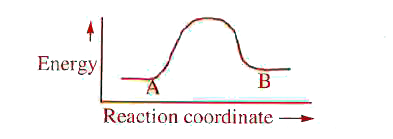The rate expression for the reaction is rate what changes in the initial concentrations of A and B will cause the rate of reaction to increase by a factor of eight?Solution in Telugu
The correct Answer is:B
Step by step video, text & image solution for The rate expression for the reaction A_((g))+B_((g))toC_((g)) is rate =kC_(A)^(2)C_(B)^(1//2) what changes in the initial concentrations of A and B will cause the rate of reaction to increase by a factor of eight? by Chemistry experts to help you in doubts & scoring excellent marks in Class 12 exams.
Updated on:21/07/2023Topper's Solved these Questions
- CHEMICAL KINETICSBOOK - AAKASH SERIESCHAPTER - CHEMICAL KINETICSEXERCISE - OBJECTIVE EXERCISE - 2 (Reaction rates and influencing factors)
15 Videos
- CHEMICAL KINETICSBOOK - AAKASH SERIESCHAPTER - CHEMICAL KINETICSEXERCISE - OBJECTIVE EXERCISE - 2 (Collision theory)
2 Videos
- CHEMICAL KINETICSBOOK - AAKASH SERIESCHAPTER - CHEMICAL KINETICSEXERCISE - OBJECTIVE EXERCISE - 1 (Collision theory)
14 Videos
- CHEMICAL KINETCSBOOK - AAKASH SERIESCHAPTER - CHEMICAL KINETCSEXERCISE - EXERCISE - 3.2
45 Videos
- CHEMICAL THERMODYNAMICSBOOK - AAKASH SERIESCHAPTER - CHEMICAL THERMODYNAMICSEXERCISE - Additional Practice Exercise
54 Videos
Similar Questions
Consider the following reaction N2(g)+3H2(g)→2NH3(g). The rate of the reaction in terms in terms of N2 at T(k) is −d[N2]dt=0.02 mole lit−1sec−1. What is the value of −d[H2]dt (in mole lit−1sec−1) at the same temperature?
View SolutionThe minimum energy required for molecules to enter into chemical reactionn is called
View SolutionFor a reversible reaction, A⇔B, which one of the following statements is wrong from given energy profile diagram ?

View SolutionDiscuss on the kinetic spontaneity of a chemical reaction. Is a slow reaction spontaneous? Why?
View SolutionWhich among the following is not an exact differential?
View SolutionThe rate expression for reaction A(g)+B(g)→C(g) is rate =k[A]1/2[B]2. What change in rate if initial concentration of A and B increases by factor 4 and 2 respectively ?
View SolutionFor a reaction initial rate is given as : R0=k[A0]2[B0]. By what factor, the initial rate of reaction will increase if initial concentration is taken 1.5 times and B is tripled?
View SolutionFor A_((s))+B_((s))toC_((s)) ,rate= k[A]^(1//2)[B]^(2) , if initial concentration of A and B are increased by factors 4 and 2 respectively, then the initial rate is changed by the factor:
View SolutionThe rate expression for the reaction A(g) + B(g) to C(g) is rate = KC_A^2 C_B^½ . What changes in the initial concentration of A and B will cause the rate of reaction increase by a factor of eight?
View Solutionअभिक्रिया की कोटि, जिसकी दर =kC5/2A.C−3/2B है, होगी
View SolutionFor a reaction initial rate is given as : R0=k[A0]2[B0]. By what factor, the initial rate of reaction will increase if initial concentration is taken 1.5 times and B is tripled?
View SolutionThe rate expression for the reaction A_((g)) + B_((g)) rarr C_((g))" is rate" = k[A]^(2)[B]^(1//2) . What changes in the initial concentrations of A and B will cause the rate of reaction to increase by a factor of eight?
View SolutionThe rate expression for the reaction A_((g))+B_((g))toC_((g)) is rate =kC_(A)^(2)C_(B)^(1//2) what changes in the initial concentrations of A and B will cause the rate of reaction to increase by a factor of eight?
View SolutionFor an elementary reaction with respect to 2A_((g))+B_((g))toC_((g)) , initial rate with respect to A is 0.04" M.s"^(-1) . when volume of vessel is doubled, final rate B will be ("in M.s"^(-1))
View SolutionFor a reaction initial rate is given as : R0=k[A0]2[B0]. By what factor, the initial rate of reaction will increase if initial concentration is taken 1.5 times and B is tripled?
View Solution
